中考英语语法专题详解十五
专题15 非谓语动词(单选题和填空题)-备战2023年中考英语语法常考点专项突破精选题集(解析版)
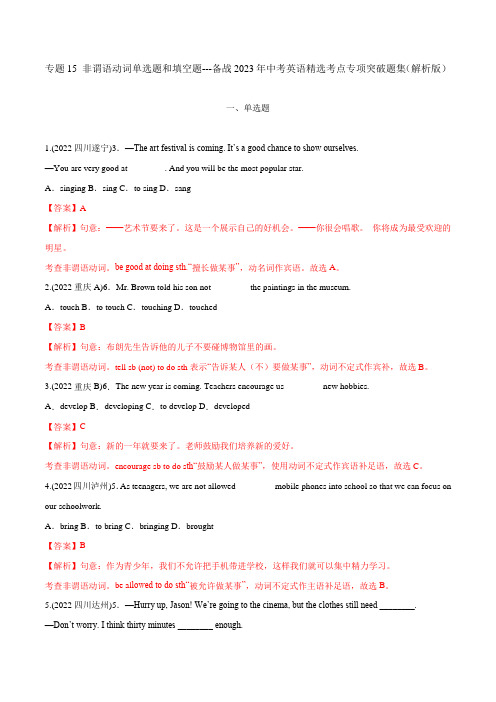
专题15 非谓语动词单选题和填空题---备战2023年中考英语精选考点专项突破题集(解析版)一、单选题1.(2022四川遂宁)3.—The art festival is coming. It’s a good chance to show ourselves.—You are very good at ________. And you will be the most popular star.A.singing B.sing C.to sing D.sang【答案】A【解析】句意:——艺术节要来了。
这是一个展示自己的好机会。
——你很会唱歌。
你将成为最受欢迎的明星。
考查非谓语动词。
be good at doing sth.“擅长做某事”,动名词作宾语。
故选A。
2.(2022重庆A)6.Mr. Brown told his son not ________ the paintings in the museum.A.touch B.to touch C.touching D.touched【答案】B【解析】句意:布朗先生告诉他的儿子不要碰博物馆里的画。
考查非谓语动词。
tell sb (not) to do sth表示“告诉某人(不)要做某事”,动词不定式作宾补,故选B。
3.(2022重庆B)6.The new year is coming. Teachers encourage us ________ new hobbies.A.develop B.developing C.to develop D.developed【答案】C【解析】句意:新的一年就要来了。
老师鼓励我们培养新的爱好。
考查非谓语动词。
encourage sb to do s th“鼓励某人做某事”,使用动词不定式作宾语补足语,故选C。
4.(2022四川泸州)5.As teenagers, we are not allowed ________ mobile phones into school so that we can focus on our schoolwork.A.bring B.to bring C.bringing D.brought【答案】B【解析】句意:作为青少年,我们不允许把手机带进学校,这样我们就可以集中精力学习。
专题15-非谓语动词-备战2023年中考英语一轮复习语法专项练(通用版)(解析版)
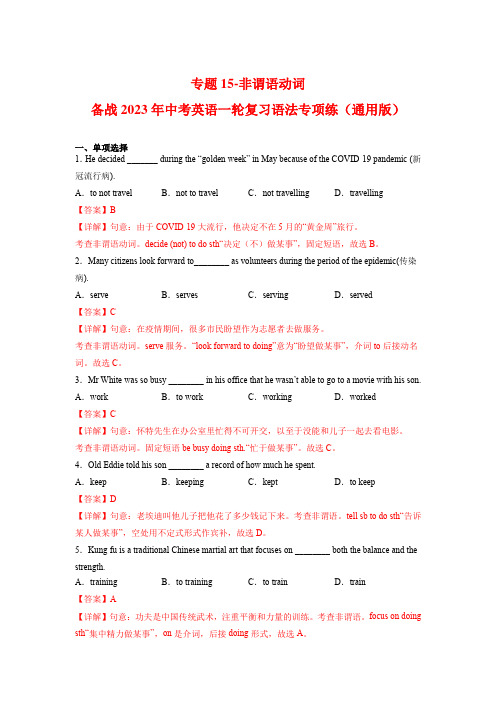
专题15-非谓语动词备战2023年中考英语一轮复习语法专项练(通用版)一、单项选择1.He decided _______ during the “golden week” in May because of the COVID-19 pandemic (新冠流行病).A.to not travel B.not to travel C.not travelling D.travelling【答案】B【详解】句意:由于COVID-19大流行,他决定不在5月的“黄金周”旅行。
考查非谓语动词。
decide (not) to do sth“决定(不)做某事”,固定短语,故选B。
2.Many citizens look forward to________ as volunteers during the period of the epidemic(传染病).A.serve B.serves C.serving D.served【答案】C【详解】句意:在疫情期间,很多市民盼望作为志愿者去做服务。
考查非谓语动词。
serve服务。
“look forward to doing”意为“盼望做某事”,介词to后接动名词。
故选C。
3.Mr White was so busy ________ in his office that he wasn’t able to go to a movie with his son. A.work B.to work C.working D.worked【答案】C【详解】句意:怀特先生在办公室里忙得不可开交,以至于没能和儿子一起去看电影。
考查非谓语动词。
固定短语be busy doing sth.“忙于做某事”。
故选C。
4.Old Eddie told his son ________ a record of how much he spent.A.keep B.keeping C.kept D.to keep【答案】D【详解】句意:老埃迪叫他儿子把他花了多少钱记下来。
人教版初三英语上unit15知识点讲解及练习
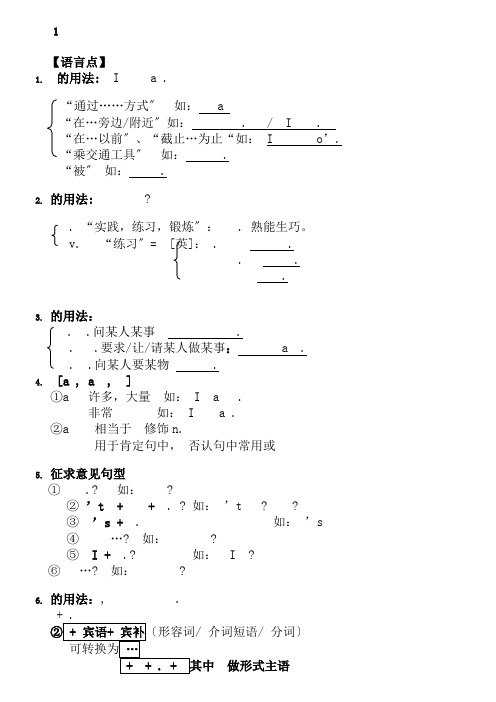
1【语言点】1.的用法: I a .“通过……方式〞如: a“在…旁边/附近〞如: . / I .“在…以前〞、“截止…为止“如:I o’.“乘交通工具〞如: .“被〞如: .2.的用法: ?. “实践,练习,锻炼〞: . 熟能生巧。
v. “练习〞= [英]: . .. ..3.的用法:. .问某人某事 .. .要求/让/请某人做某事: a .. .向某人要某物 .4. [a , a , ]①a 许多,大量如: I a .非常如: I a .②a 相当于修饰n.用于肯定句中,否认句中常用或5.征求意见句型①.? 如: ?②’t + + . ? 如:’t ? ?③’s + . 如:’s④…? 如: ?⑤ I + .? 如: I ?⑥…? 如: ?6.的用法:, ./ 介词短语/ 分词〕做形式主语I ....I .③还可作形式主语: + . +7. ./ 过去分词/ 现在分词〕使某种情况发生把鞋擦干净 .我想去修自行车 I .你不能让他老等着’t .②可作系动词〔〕系动词表保持〔〕表改变〔〕 .感官动词〔…起来〕……③的用法:…“在…的末尾、末端〞n. “最后〞,“终于〞( , ) I .“到…完毕时/…时为止 , I .v. . 完毕做某事= .以…完毕 .8.的用法:I ……从句恐怕…I’m I ’t ..不敢做某事 .害怕 I I .9.处理: ?:侧重于方式,方法,特殊疑问句中用 I 't .: 侧重对象,特殊疑问句用 I 't .10.除非,假设不,如果不。
引导条件状语从句如: ..假设你不努力你会失败。
I ’t . 除非他先写要不我不写11. . / . 看见某人正在做某事强调正在发生. / . 看见某人在做某事如: a . 她看见他正在教室里画画。
12.“也〞也、而且〔用于肯定句〕常在句子的中间也〔用于否认句〕常在句末也 (用于肯定句) 常在句末【重点语法】1.动词+ 构造2.动词不定式及动名词在句中成分3.现在完成时复习( ) 1. . .A. B. C. D.( ) 2. ?.( ) 3. ?A. C. D.( ) 4. .A. B. C.( ) 5. 't .'d .A. B. C. D.( ) 6. , .’t ,A. B C. D.( ) 7. .A. B. C. D.( ) 8. , .A. B. C. D.( ) 9. , .A. B. C. D.( ) 10. a .A. B. C. D.【单项选择】( ) 1. ?A. B. C. D.( ) 2. .A. B. C. D.( ) 3. ?A. B. C. D.( ) 4. ?A. B. C. D.( ) 5. ?A. B. C. D.( ) 6. I . I ’t , .A. B. C. D.【同义句转换】1. 't ??2. I .I .I .3. , ., .4. I 't .I 't .2: I【语言点】1. I .〔1〕表示过去的一种行为和习惯,它的后面用动词原形,否认句和疑问句用助动词,也可以用的本身,是较老的英国英语的用法。
2023年中考英语复习第二部分语法专题突破专题十五交际用语

专题十五交际用语(限时:10分钟满分:22分)单项填空(共22小题;每小题1分,满分22分)1.—Tony,hurry up and don’t forget to lock the door.—.I’m getting my coat. (A)A.Wait a minuteB.No dealC.Nothing seriousD.Bad luck2.—My parents will take me to Universal Beijing Resort this summer holiday.—. (D)A.Good luck to youB.It’s a good ideaC.Best wishes to youD.Have a good time3.—Excuse me,may I take the dog with me,sir?—.Pets are never allowed in.You can keep it in the Animal Center next door. (C)A.Yes,pleaseB.It’s up to youC.I’m afraid notD.Never mind4.—I’m a little nervous before the coming exam.—.I’m sure you can make it. (C)A.Sounds greatB.Have funC.Take it easyD.You’re welcome5.(2022·黑龙江龙东改编)—Do you mind my sitting here?—.It’s for Mr.Smith. (A)A.You’d better notB.Not at allC.No,I don’tD.Hurry up6.—He hardly works but he wishes to get full marks in the final exam.—!No one can succeed without any effort. (C)A.No problemB.Well doneC.No wayD.Best wishes7.(2022·湖北天门)—Tom,turn off the light.Don’t keep it on.—. (B)A.You’d better notB.OK,I willC.Not at allD.You’re welcome8.—Would you like to go to the park with us this Sunday?—.I haven’t been outdoors these days.I can’t wait! (B)A.Sorry,I can’tB.Sure,I’d love toC.Certainly notD.My pleasure9.—I just got a message from Ms.Yang and she said she would come to our meeting this afternoon. —She always has good ideas. (D)A.Why not?B.What a pity!C.Time is up.D.That’ll be very nice.10.(2022·合肥肥西县二模)—Time to get on the train.I must leave now.—See you! (D)A.Not bad!B.Bad luck!C.Don’t worry!D.Take care!11.(2022·湖北十堰)—I am going to take an exam tomorrow.—(C)A.Wonderful!B.Help yourself.C.Good luck!D.Hurry up.12.(2022·芜湖二模)—Would you please help me with this math problem?—. (A)A.With pleasureB.My pleasureC.That’s rightD.You are welcome13.—Sorry,I forgot to buy a pen for you.—.I’ll get one myself tomorrow. (A)A.Never mindB.No wayC.Of course notD.You’re welcome14.—Where shall we go for vacation,Daddy?—.I know you are good at making traveling plans. (C)A.It’s not a big dealB.Don’t worryC.It’s up to youD.It’s a pleasure15.—It’s sunny today.What about going out for a bike riding along the Binhe Road?—Let’s ask Fred to go with us! (D)A.Best wishes!B.That’s too bad!C.Why?D.Sounds great!16.(2022·亳州一模)—Mom,I have won the English speaking competition.—,my son! (C)A.I agree with youB.Have a good timeC.CongratulationsD.You are lucky17.(2022·黄山歙县一模)—!I missed the beginning of the concert.—Don’t worry.I have taken a video of it for you. (B)A.No wayB.What a pityC.How comeD.What a mess18.(2022·芜湖无为市一模)—There must be something interesting happening there.People are talking happily. —Let’s go and see what’s happening. (D)A.I hope so.B.How come?C.Why not?D.I guess so.19.—Will you take part in the Summer Camp this vacation?—.I’m not sure. (D)A.CertainlyB.Good luckC.No problemD.It depends20.—I plan to find a part⁃time job in the coming summer holiday.—.You are sure to learn a lot from working. (A)A.Good ideaB.Good jobC.See you laterD.You’d better not21.(2022·湖北武汉)—Can I have two tickets for the Chinese Poetic Dance?—.All the tickets have been sold out. (A) A.I’m sorry B.Of courseC.Never mindD.Thank you22.—Remember to ask her to call me back.—. (D)A.Never mindB.That’s rightC.Up to youD.Got it。
2015中考英语—第一部分 语法专题研究:专题十五 情景交际
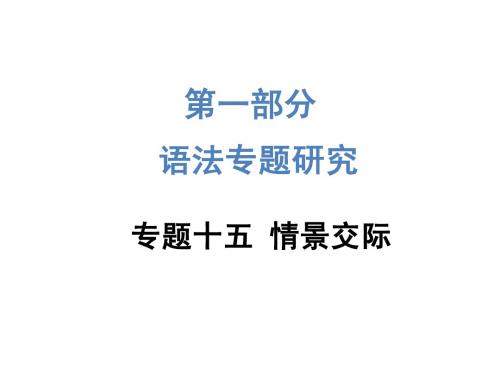
我很紧张。”“______,玛丽亚,你可以
的。”That’s true那是真的; Come on 加油; With pleasure 我的荣幸;I’ll think it over我会再考虑考虑 的。根据句意,故选B。
4. —Mom, I won first place in the 1,000
meter race.
I wonder if...我想知道是否可以……
Do you mind if I...?/Would you mind if I...?你是否介意 我……?
(2)肯定答语: Yes./Sure./Of course./Yes, I will. 当然可以。
No, not at all. 不,不介意。
(2)应答语: I love them.我喜欢它们。
I can’t stand them.我忍受不了它们。
Me, too.我也一样。 It was great!它太棒了! Yes, I think so.是的,我认为是这样的。 Sure, I am.当然,我是。
So did I.我也是。
So am I.我也是。 That sounds exciting.那听起来很令人兴奋。 Well done.干得好。 They are wonderful.它们太完美了。
—____I am proud of you.
A. Well done! B. Never mind.
C. Don’t mention it.
D. Yes, I’d love
【解析】 考查情景交际。句意“妈妈,我赢得了一千 to
米赛跑步的第一名。”“______我以你为荣。”Well
done干得好;Never mind别介意;Don’t mention it 不要客气;Yes, I’d love to是的,我喜欢。根据句意, 故选A。
【中考英语 高频考点精选】15 非谓语动词(高频考点精选)(解析版)

15 非谓语动词高频考点小贴士:非谓语动词是每年中考英语必考的考点,也是我们中学英语语法的重点和难点。
它包括不定式、动词-ing和过去分词三种形式。
非谓语动词在句子当中不充当谓语,它不受主语的限制,但是它有时态和语态的变化。
为了方便复习,把主要的考点以思维导图形式提供给大家。
1.It's important for the disabled______the ability to make a living.()A.to have B.have C.having D.has参考译文:对残疾人来说,有谋生的能力是很重要的。
答案详解:分析句子可知,本句为It's important for sb to do sth为固定句型,意为"做某事对某人来说是怎么样的",it为形式主语,真正的主语为to do不定式。
所以选:A。
2.______ too much sweet food will make people get fat.()A.Eating B.Eats C.Eat D.Ate参考译文:吃过多的甜食会使人发胖。
答案详解:分析句子可知,空格部分在句中作主语,因此使用动名词形式。
所以选:A。
3.Jenny's parents were completely__________ when they saw the_______ changes in her.()A.surprising;amazing B.surprised;amazingC.surprising;amazed D.surprised;amazed参考译文:Jenny 的父母看到她身上发生的惊人变化时完全惊愕了.答案详解:surprising 令人吃惊的,通常形容事或物;surprised 感到吃惊的,通常形容人;amazing 令人惊愕的,通常说明事或物;amazed 感到惊愕的,通常说明人.第一个空格说明的是parents,第二个空格说明的是changes,所以只有选项B符合要求.所以选:B。
2021年湖南省长沙市中考英语语法专项练习:专题15 复合句

专题(十五)复合句Ⅰ.单项选择|宾语从句|1. Always tell your parents you are going and you expect to be home.A.what; whereB.when; whereC.where; when2.—Do you know to see the Beijing Opera?—Yes, you can go to Mei Lanfang Theatre.A.where can we goB.where we can goC.when shall we go3.—Excuse me. Could you tell me ?—In half an hour.A.what time does the plane take offB.what time the plane takes offC.what time did the plane take off4.—Dad, can you tell me ?I miss her very much.—Next week, dear.A.where my mum will goB.when will my mum come backC.when my mum will come back5.—Tom, I wonder .—In Beijing, the first city to host both the Summer and Winter Olympics.A.where will the 24th Winter Olympics be heldB.where the 24th Winter Olympics will holdC.where the 24th Winter Olympics will be held6.—Welcome back to school, Tim. I want to know online.—Of course, Ms. Clark, I was hard-working.A.if you studied hardB.what you studiedC.when you studied7.—Excuse me, Mr. Wang. Do you know ?—Yes. It's on May 20th.A.when is the school tripB.how we can go thereC.when the school trip is8. Wow, your dress is so beautiful. Could you tell me ? —Oh. I bought it in an online store.A.when you bought itB.where you bought itC.how much you spent on it9.—Could you tell me to the art museum?—Sure. Bus No. 26.A.why you will goB.how I can getC.which bus I can take10.—Mr. Wu, can you tell me ?—We get together and eat mooncakes.A.how do you celebrate the Mid-Autumn FestivalB.how Chinese people celebrate the Chinese New YearC.what Chinese people usually do on the Mid-Autumn Festival11. Jenny just wondered Angela already knew about the event.A.how muchB.how manyC.how often12.—Excuse me, would you please tell me ?—Certainly. It's about ten minutes' walk.A.where is the nearest shopB.how far the nearest shop isC.how soon can I reach the nearest shop13.—What did Lily say to you just now, Emma?—She wanted to know .A.what will I do this SundayB.why I am late for class this morningC.if I could go shopping with her tonight14.—Could you tell me ?—Sure, go along this street, and turn left at the second crossing. You'll find the bank on your right.A.how I can get to the Bank of ChinaB.where is the Bank of ChinaC.where can I find the Bank of China15.—Mum, can you tell me I can wear the face mask(口罩)?—Cover your face and nose with it and make sure there's no space between them.A.whenB.howC.where16. The school suggested the students pass on they have learned to their parents.A.whatB.thatC.which17.—Could you tell me ?—Throwing off poverty (脱贫).A.who people often talk about this yearB.what people often talk about this yearC.which do people often talk about this year18.—Do you know ?—Sorry, I've never had an e-book before. Why not read the instructions first?A.how can I turn the e-book onB.how I can turn the e-book onC.where can I buy an e-book19.—Do you know ?—At 9:00 tomorrow morning.A.when the video meeting beganB.when did the video meeting beginC.when the video meeting will begin20. My cousin will drive me to school today, but I don't know .A.what he'll doB.where he'll goC.when we'll leave21.—What did Tom say to you just now, John?—He asked .A.what I am so happy todayB.what will I do for the weekendC.if I could go to the movies with him tonight22.—Could you please tell me ?—Sure. On Friday afternoon.A.where the book sale isB.when the book sale isC.what the book sale is about|状语从句|1.—Excuse me. Where is the nearest hotel?—Just go down this road you see a library. It's across from it.A.untilB.becauseC.though2.—Louis, are you leaving for Guilin for your trip tomorrow?—No. It will be two days I start my trip.A.afterB.asC.before3.You can succeed in anything you put your mind to it.A.unlessB.ifC.though4.—What do you feel you are looking through the old pictures?—How time flies.A.becauseB.thoughC.while5.—Tom, I hear that we can't take photos here in order to protect the paintings.—Really? But there is a sign saying “You will not be allowed to take photos you use a camera without a flash.”A.ifB.whenC.unless6. Swimming is, of course, interesting. But we plan to go swimming, being safe must come first.A.thoughB.whenC.unless7. The band never starts performing all the seats are taken.A.becauseB.untilC.but8.—I'm wondering whether I could watch Frozen 2; after all I've grown up a little bit. —Well, I watched it yesterday. the film is to meet the needs of children, I promise you'll be also pleased with it.A.BecauseB.AlthoughC.As9.—Did Tom get good grades in the final math exam?—Yes, he did. To my surprise, he could get over difficult problems he succeeded at last.A.so; thatB.such; thatC.too; to10.A lot of people like reading newspapers they can learn what is happening in the world.A.so thatB.even thoughC.as soon as11. Restaurants must stop offering free plastic bags in Beijing customers ask for them.A.sinceB.unlessC.because12.—What do you think of your junior high school life?—I think it is enjoyable, I sometimes have some trouble in study.A.ifB.thoughC.while13.Emma was afraid of the dog when she was young. She would run away she saw it.A.so thatB.as soon asC.ever since14.—Did you say anything to your parents they shouted at you?—No, I was afraid to talk back. They looked really serious and scary.A.unlessB.whyC.when15.Our teachers have been with us for nearly three years we came to junior high school. We should thank them for what they have done for us.A.untilB.beforeC.since16. it is often cold in the mountains, you need to wear warm clothes.A.ThoughB.UnlessC.As17. I do, I do it for you. Do not ever doubt that, my boy.A.WhateverB.WhereverC.Whenever18.—I'm afraid e-books might be bad for our eyes.—Hmm, but they will be helpful for us we put them to good use.A.so thatB.as long asC.even though19.It's hard for us to say goodbye we have so many happy days to remember.A.soB.becauseC.although|定语从句|Ⅰ.单项选择1. We are supposed to care about the workers keep our city clean.A.whichB.whoC.whom2.—Do you know the old man wears glasses on TV?—Of course. He's Zhong Nanshan.A.whoB.whomC.which3. The book cover has a beautiful picture is Lily's.A.whichB.whoseC.that4. In America, Thanksgiving is a holiday celebrates the love of family.A.whoB./C.that5.—What are they talking about?—They are talking about the greatest inventions have made a big difference to our daily life.A.whichB.whoC.that6.—Have you seen the film The Wandering Earth?—Yes, it's the best one I have ever seen.A.thatB.whichC.what7.—Do you know the girl is giving the speech?—Of course. She is my best friend, Meimei.A.whichB.whoC.whom8.[2020·牡丹江]Parasite(《寄生虫》) became the first non-English best movie has won Oscars in history.A.thatB.whichC.who9. Would you please tell me about the plan you made you leave?A.who; afterB.what; whenC.that; before10. Du Fu is a great Chinese poet has become popular with many people around the world.A.whichB.whomC.who11. Today I can see a hall full of talented teens graduated from Changsha International Experimental Middle School, eyes are full of hope for the future.A.whereB.whoC.whose12.—Is that all?—Yes. That's all I want to take.A.whichB.thatC.who13. Children like stories have happy endings, and so do many old people.A.whoB.whichC.what14. The engineer my father works is about 50 years old.A.whoB.as whomC.with whom15.—Frank, look! Who are the children under the tree waiting in line?—They are the students from No.1 Primary School.A.that areB.where areC.which is16.All of us will never forget the great time we spent together in our school though it's time to say goodbye.A.whichB.whenC.what17.—What are you doing?—We are talking about the books and writers we like.A.thatB.whichC.who18.My hometown is the place holds all my sweet memories.A.whoB.whichC.what19.Yesterday Mr. Green went to his hometown and visited the old house he was born in.A.whichB.whereC.what20.I will never forget the time the talented kids realized their dreams.A.thatB.whenC.whichⅡ.翻译1.他们认为家庭作业给孩子们太多的压力。
初中英语语法讲解-15个专题汇总(习题和答案)word版
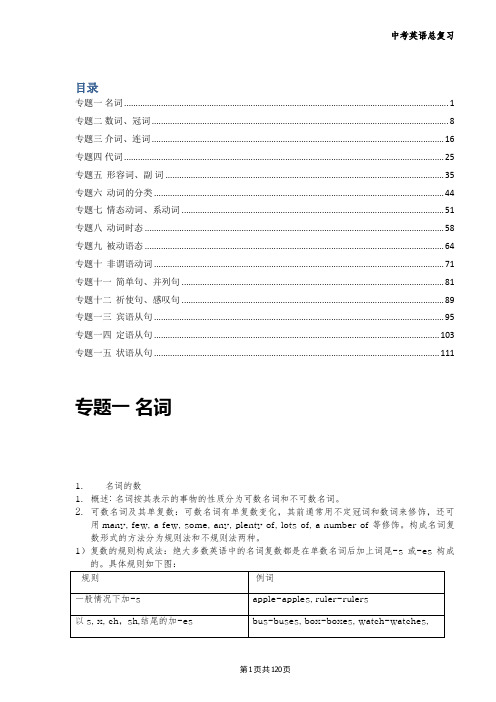
目录专题一名词 (1)专题二数词、冠词 (8)专题三介词、连词 (16)专题四代词 (25)专题五形容词、副词 (35)专题六动词的分类 (44)专题七情态动词、系动词 (51)专题八动词时态 (58)专题九被动语态 (64)专题十非谓语动词 (71)专题十一简单句、并列句 (81)专题十二祈使句、感叹句 (89)专题一三宾语从句 (95)专题一四定语从句 (103)专题一五状语从句 (111)专题一名词1.名词的数1.概述: 名词按其表示的事物的性质分为可数名词和不可数名词。
2.可数名词及其单复数:可数名词有单复数变化,其前通常用不定冠词和数词来修饰,还可用many, few, a few, some, any, plenty of, lots of, a number of 等修饰。
构成名词复数形式的方法分为规则法和不规则法两种。
1)复数的规则构成法:绝大多数英语中的名词复数都是在单数名词后加上词尾-s或-es构成的。
具体规则如下图:a.单复同形的:Chinese-Chinese, Japanese-Japanese, deer-deer, sheep-sheep, fish-fish(表示鱼的数量)b. 熟记下列词的复数变化:man-men, woman-women, policeman-policemen, foot-feet, tooth-teeth, mouse-mice, child-childrenc. 以man, woman做定语构成的复合名词,变复数时要全变:a man teacher-two men teachers; 其他情况一般只变主体名词而作定语的名词不变:a girl student-two girl students3. 不可数名词:不可数名词没有单复数。
如:water, meat, air等。
在表示数量时,通常用以下方法。
1)用some, much, a little, little, a lot of, lots of, plenty of 等表示多少。
2022年初中英语中考语法基础版复习讲义(十五)复合不定代词知识点总结(含练习)
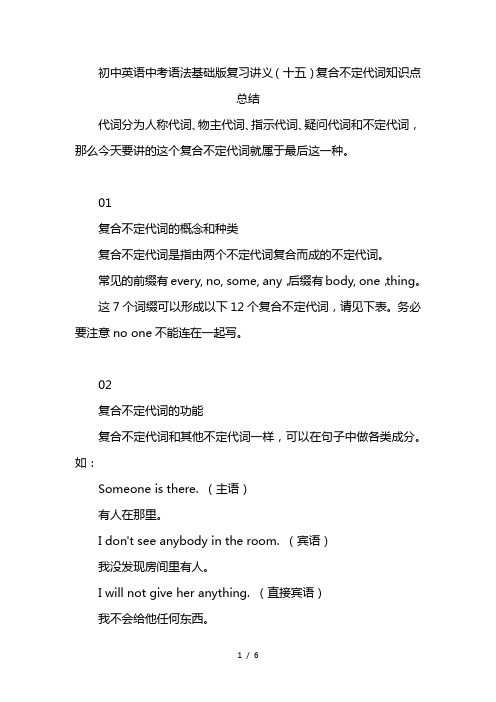
初中英语中考语法基础版复习讲义(十五)复合不定代词知识点总结代词分为人称代词、物主代词、指示代词、疑问代词和不定代词,那么今天要讲的这个复合不定代词就属于最后这一种。
01复合不定代词的概念和种类复合不定代词是指由两个不定代词复合而成的不定代词。
常见的前缀有every, no, some, any,后缀有body, one,thing。
这7个词缀可以形成以下12个复合不定代词,请见下表。
务必要注意no one不能连在一起写。
02复合不定代词的功能复合不定代词和其他不定代词一样,可以在句子中做各类成分。
如:Someone is there. (主语)有人在那里。
I don't see anybody in the room. (宾语)我没发现房间里有人。
I will not give her anything. (直接宾语)我不会给他任何东西。
You are somebody. (表语)你是个人物。
03复合不定代词的三个注意事项复合不定代词的以下用法要注意:a. 复合不定代词做主语,谓语一般要用单数。
“Something delicious is coming,”the tiger thinks.“有好吃的东西靠近”,老虎想。
Everybody wants to kiss the baby.每个人都想亲亲那个宝宝。
b. some和some开头的复合不定代词一般用于肯定句,any 和any开头的复合不定代词一般用在否定句和疑问句。
I have got something to print.我有一些要打印的东西。
I don't want anyone to interrupt me.我不想让任何人打扰我。
注意:当询问吃喝,并想得到肯定的答案时,疑问句中可以用some。
如:would you like to have some water?你想来点水吗?此外,当anyone/thing表是任何的含义时,也可以用在肯定句中。
第十五章句子的成分(思维导图+知识梳理+好题精炼)2022-2023初中英语中考语法归纳

第十五章句子的成分思维导图知识梳理一、句子成分概说句子的各个组成部分,叫做句子成分.英语的句子成分有:主语、谓语、表语、宾语、定语、状语、宾语补足语等.此外有些句子还带有呼唤语、感叹语、插入语,它们在句法上与句子的其他成分不发生关系,叫做独立成分.句子的成分一般由实词担任.实词有名词、代词、形容词、数词、动词和副词.虚词在句子中只起辅助和联系作用,不能做句子成分.虚词有冠词、介词、连词、助动词等.二、句子成分(一)主语主语是一句话的主题,是说话人要说明的对象,表示所谈的是“谁”或是“什么”.主语一般在谓语之前.英语里可担任主语的有名词、代词、数词、名词化的形容词、不定式(短语)、-ing分词(短语)、从句等.Beijing is the capital of China.北京是中国的首都.(名词作主语)They have lived in Beijing since 2019.自2019年以来,他们就住在北京.(代词作主语)Ten is a very important number.10是一个重要数字.(数词作主语)The rich are getting richer and the poor are getting poorer. 富者愈富,贫者愈贫.(名词化的形容词作主语) To read in the sun is bad for your eyes.太阳下看书对你的眼睛不好.(不定式“短语”作主语)Smoking is bad for you.吸烟对你有害.(-ing分词作主语)Whenever you are ready will be fine.你不论什么时候准备好都行.(从句作主语)(二)谓语1.概说谓语是说明主语“做什么”“是什么”或者“怎么样”.谓语(谓语部分里主要的词)用动词.动词常分为实义动词、连系动词、情态动词以及助动词.情态动词和助动词不能单独充当谓语,它们必须和实义动词或系动词一起构成谓语.实义动词包括及物动词和不及物动词,及物动词后面要带宾语.通常情况下,谓语位于主语之后.谓语和主语在“人称”和“数”两方面必须一致.谓语有简单谓语和复合谓语之分.(1)简单谓语.简单谓语由一个动词或短语动词构成.它有时态、语态、语气等.She likes drawing.她喜欢画画.I had finished my homework before 9 o'clock.在9点前我已完成我的家庭作业.(2)复合谓语.①由“连系动词+表语”构成复合谓语.The game is very boring.这场比赛真没劲.②由“情态动词+动词原形”构成复合谓语.She can swim very fast.她游泳游得很快.2.谓语和主语的一致一个句子的谓语动词与主语必须在人称和数上保持一致,规则如下:(1)主语是单数必须跟单数形式的动词,主语是复数必须跟复数形式的动词.He is a friend of mine.他是我的一个朋友.(2)两个或两个以上的单数名词由and连接起来作并列主语时,谓语动词用复数.You,he and I arr all students.我、你和他都是学生.He and I like green tea.我和他都喜欢绿茶.点拨(1)用and连接的两个名词如果表示一个整体,谓语动词仍用单数形式.Bacon and eggs was served.火腿和蛋端了上来.Fork and knife was used instead of chopsticks.用刀叉而不是用筷子.(2)有every或each修饰的单数名词并列时,谓语动词用单数形式.第二个every或each可省略.Every hour and(every)minute is important.每一小时,每一分钟都很重要.Each man and(each)woman has a seat.每位男士和女士都就座了.(3)主语是单数,后面有其他干扰的成分如with,together with,along with,aswell as,no less than,like,but,except等短语时,仍和单数形式的谓语动词连用.The teacher,as well as the pupils,is doing morning exercises.老师和学生在做早操.A woman with a baby is coming to the hospital.一个妇女抱着一个婴儿正向医院走来.(4)当两个主语由or,either...or,neither...nor或not only...but also等连接时,谓语动词应和最邻近的主语一致.His parents or his sister often helps him.要么是他父母要么是他姐姐(妹妹)常帮助他.Either Tim or hs brothers have to tidy the room.不是蒂姆,就得是他的兄弟们去打扫房间.Neither the teacher nor the students know the answer.老师和学生都不知道答案.Not only the pupils but also the teacher is going to the cinema.不但学生们,而且连老师也要去看电影.(5)有些集体名词,如:people,police,youth,cattle等用作主语时,谓语动词用复数形式.The police are looking for the missing child.警察在寻找失踪的儿童.People standing there are talking about the bad news.站在那边的人正在议论那个坏消息.Catle arr also kept.还养牛.点拨但people作“民族”解时,作单数用.The Chinese people is a great people.中华民族是一个伟大的民族.(6)有些名词以“s”结尾,但却是单数.如:news,physics,maths,politics等.所以谓语动词应用单数形式.What's the news?这消息是什么?Physics is not very easy to learn.物理不很容易学.Maths is not easy to learn.数学不容易学.(7)在由here和there引起的句子中,如有两个或两个以上的主语,谓语动词通常和最邻近be的那个名词一致.Here are some envelopes and paper for you.这儿有几个信封和纸给你.There is a pen and three books on the desk.书桌上有一支钢笔,三本书.(8)集体名词作主语时,如作为整体看待,谓语动词用单数;如作为个体看待,则用复数.这类集体名词有audience(观众,听众),class(班级),committee(委员会),couple(夫妇),family(家庭),government(政府),group(小组),team(队),army(部队)等.My family is a small one.我的家庭是个小家庭.My family are listening to the radio.我家里人正在听广播.(9)each和由some,any,no,every构成的复合代词,在意义上属于单数.它们作主语时,谓语动词用单数形式.Each day is better than the one before.一天比一天好.Every student must be here on time.每个学生必须按时到这里来.(10)Chinese,French,English,Japanese等名词作主语表示语言时,用单数动词;表示人时,用复数动词.English is spoken in many countries.许许多国家讲英语.The Chinese are very friendly.中国人很友好.(11)表示时间、重量、价值、长度、距离等的复数名词作主语时,把它视作一个整体,谓语动词用单数形式.Fifty years is not a short period.50年并不是一个短时期.Twenty miles is a long way to walk.走二十英里路可是很长的一段路程.(12)a number of与the number of作主语.“a number of+复数可数名词”表示“一些”“许多”的意思,谓语动词用复数;“t he number of+复数可数名词”表示“······的数目、数量”,谓语动词用单数.A number of books are missing from the library.图书馆丢了许多书.The number of workers in this factory is increasing.这家工厂的工人数目正在增加.(三)表语是指跟在连系动词be,seem,look,sound,feel,get,smell,become等词后面的词语或从句,用以说明主语的身份、特征和状态.由名词、代词、形容词、数词、副词、动词不定式、介词短语、-ing分词、过去分词(短语)、从句等充当.You are a student.I am a student,too.你是学生,我也是学生.(名词作表语)-Who is it?是谁呀?-It's me/I.是我.(代词作表语)当人称代词作表语时,在口语中常用宾格,在正式文体中用主格.The girl is quite pretty.这个姑娘长得相当漂亮.(形容词作表语)Five plus seven is twelve.5加7是12.(数词作表语)The meeting is over.会议结束了.(副词作表语)My books are on the desk.我的书在书桌上.(介词短语作表语)My wish is to be an artist.我的愿望是成为一名艺术家.(动词不定式短语作表语)What he likes is reading novels.他的喜好是读小说.(-ing分词短语作表语)Are you excited about your new job?你对你的新工作感到高兴吗?(过去分词作表语)The question is what we should do first.问题是我们先干什么.(从句作表语)(四)宾语1.直接宾语宾语表示动作的对象或行为的承受者,用在及物动词或相当于及物动词的短语动词之后.可以作宾语的有名词、代词、数词、不定式(短语)、名词化的形容词、-ing分词(短语)、从句等.(1)名词作宾语.She is playing the piano now.她正在弹钢琴.Please open the door.请把门打开.(2)代词作宾语.She often helps us with our study.她常常帮助我们学习.We should keep these in mind.我们应该记住这些.(3)数词作宾语.I can give two.我可以给两个.I like the first.我喜欢第一个.(4)不定式(短语)作宾语.He tried to catch up with his dassmates.他设法赶上他的同学.I hate to sing.我不喜欢唱歌.(5)名词化的形容词作宾语.We should respect the old.我们应尊敬老人.The scientists may find out the unknown.科学家们可以发现未知的事物.(6)-ing分词(短语)作宾语.Return the book to the library as soon as you finish reading it.你一看完这本书就还回图书馆.He enjoys wvatching TV plays.他喜欢看电视剧.(7)从句作宾语.She said that she was busy.她说她很忙.The mother asked how her daughter was.母亲问她的女儿身体如何.2.间接宾语在英语中,有些及物动词,如bring,give,send,show,tell,teach,lend,pass等,可以有两个宾语,一个指人,一个指物,指人的叫做间接宾语,指物的叫做直接宾语,间接宾语一般放在直接宾语之前.Can you give me any information on this matter?你能给我提供这些事的任何信息吗?Write me a letter every month,please.请每月给我写封信.Please make her a model plane.请给她做个飞机模型.有时,也可以在间接宾语之前加介词to或for,构成介词短语,并把这个短语放在直接宾语之后.Mother bought the handkerchieffor you, not for me.母亲是给你,而不是给我买的手帕.I took it to the policeman on duty.我把它交给了值勤的警察.(五)定语定语是修饰名词或代词的.定语有前置定语和后置定语之分.一般来说,形容词、代词、数词、名词或名词所有格等作定语时通常放在被修饰的词之前作前置定语;而副词、介词短语、不定式短语、-ing分词短语、-ed分词短语、从句作定语时通常放在被修饰的词之后作后置定语.He said he had an important meeting to attend.他说他有一个重要会议要出席.(形容词作前置定语)This is my friend,Li Da.这是我的朋友,李达.(代词作前置定语)When I sat down, a fourth man rose to speak.我坐下后第4个人又起来发言.(数词作前置定语)We should follow the doctor's advice.我们应该听医生的嘱咐.(名词所有格作前置定语)Who is the man over there?那边的男人是谁?(副词作后置定语)A college in London had agreed to take me.最后伦敦的一所院校同意接受我.(介词短语作后置定语)Can you give me some work to do?你能给我些活儿干吗?(不定式短语作后置定语)Who is the boy dancing over there?在那儿跳舞的少年是谁呀?(-ing分词短语作后置定语)There is a little difference between written English and spoken English.书面英语和口头英语有些不同.(过去分词词组作后置定语)I hate to see letters written in pencil.我讨厌看用铅笔写的信.(-ed分词短语作后置定语)The car that's parked outside is mine.停在外面的汽车是我的.(限制性从句作后置定语)Your car, which I noticed outside, has been hit by another one.我在外面看见你的汽车了,它被另一辆车撞了.(非限制性从句作后置定语)(六)状语1.状语的表现形式状语是修饰动词、形容词、副词以及全句的句子成分.可用作状语的有副词、名词、介词短语、不定式、-ing分词、从句等.This is even better than that.这个比那个更好.(副词作状语)The coat costs 40 dollars.这件上衣值40美元.(名词作状语)She will arrive on Monday.她将于星期一到达.(介词短语作状语)To kill bugs,spray the area regularly.为了杀死臭虫,这地方要经常喷洒.(不定式作状语)They entered the room,talking and laughing.他们又说又笑地走进房间.(-ing分词作状语)She has lived alone since her husband died.自丈夫去世后她一直独自生活.(从句作状语)2.状语的分类状语按照内容可以分为时间状语、地点状语、原因状语、目的状语、结果状语、条件状语、让步状语、方式状语、程度状语、频度状语、伴随状语.What were you doing at ten last night?昨晚十点钟你在干什么?(时间状语)I met Professor Wu at the library.我在图书馆遇见了吴教授.(地点状语)Having no money,he could not buy the TV set.因为没有钱,他不能买电视机.(原因状语)In order to get into a good school, he studies hard day and night.为了考入一个好的学校,他夜以继日地苦读.(目的状语)The wind blew with such force that people could harly stand up against it.风很大,人们几乎站不住.(结果状语)I can't do it without your help.没有你的帮助,我做不成这件事.(条件状语)Whatever/No matter what I said,he refused to go.不论我说什么他都不愿走.(让步状语)He knew the country around as he knewv his own house.他了解那儿的乡村一如他了解自己的房舍.(方式状语)They are now at breakfast, talking about the plan for their trip.他们正在吃早餐,谈论着旅行计划.(伴随状语)We are very busy.我们很忙.(程度状语)作频度状语的副词always,often,usually,seldom,ever,never等一般放在实义动词之前,连系动词之后.They can hardly stay at home alone.他们几乎不单独在家.(频度状语)They are always late for school.他们总是上学迟到.(频度状语)(七)宾语补足语英语中有些及物动词,除了要有一个直接宾语外,还要带上宾语补足语,句子的意思才能完整.宾语和宾语补足语(简称宾补)一起构成复合宾语,二者之间有逻辑上的主谓关系.可以作宾补的有形容词、副词、名词、不定式(短语)、-ing分词(短语)、-ed分词(短语)、介词短语等.I made the room beautiful.我把房子拾掇得漂漂亮亮的.(形容词作宾语补足语)Keep the lights on while you are out.你不在家时,请让灯开着.(副词作宾语补足语)They named the child John.他们给孩子取名约翰.(名词作宾语补足语)What do you want me to do?你希望我为你做些什么事?(不定式短语作宾语补足语)I saw him coming last night.我昨天晚上看见他来了.(-ing分词“短语”作宾语补足语)I had my watch mended in town.我在城里修的表.(叫别人修的表)(-ed分词“短语”作宾语补足语)You should put your things in order.你应该把你的东西摆整齐.(介词短语作宾语补足语)三、独立成分(一)呼唤语称呼人的用语,称为呼语.它可位于句首,也可位于句末或句中.Hurry up,children! or we'll be late.赶快吧,孩子们!否则我们要迟到了.Shylock,how can you hope for mercy yourself when you show none?夏洛克,如果你不宽恕别人,你自己怎能希望得到别人的宽恕呢?(二)感叹语感叹语表示喜怒哀乐等感情.它多位于句首,也可放在句中或句末.常用作感叹语的感叹词有:hello,oh,well,why,alas,ch等.Here!Don'tcry!好了!别哭了!Oh,what a beautiful garden this is!啊!这是多么美丽的花园!Well,well.Here's Jack.啊唷,杰克来了.Why,it is past noon.哎呀,已经过中午了.Ah!I have never heard of such things before!啊!我以前从未听说过这种事情!点拨(1)其他词类的词也可用作感叹词,表示突然的情绪.Fire! Fire! Water! Quick! The house is on fire.着火了!着火了!水!快!房子着火了!(2)yes和no在句子里也是一种独立成分.-Do yo know Tom?你认识汤姆吗?-Yes,I do是的,我认识.(三)插入语在叙事中途往往插入一些词语,对一句话作一些附加的解释.这类词语称为插入语.它可位于句首,句中或句尾.常用的插入语有:Ithink我想,I believe我相信,I suppose 我猜想,I must admit我必须承认,in my opinion 依我看,as far as I know 据我所知,as...is concerned 就······来说,to tell you the truth 说真的,to be frank 坦率地说,in other words 换句话说,after all毕竟,of course 当然,if you don't mind 如果你不介意的话,if I may say so 如果我可以这样说的话,等.By the way,do you know the young man's name?顺便问一下,你知道那个年轻人的名字吗?That's the cheapest suit we have,I'm afraid.恐怕那是我们最便宜的西服了.I say,let's go out for a drive next Sunday.我说,咱们下星期天开车出去兜兜风吧.To be frank, I don't think you are right.坦率地说,我认为你是错的.The cross-talk,I think,was both interesting and instructive.那个相声,我觉得既有趣又能教育人.Honestly,that is all the money I have.老实说,我所有的钱就是这些.好题精练一、从下列对话中划出独立成分1.Wife:First,we need money; second,we need another baby.Husband: Sad to say,I can't trust a woman any more.2.Tom:Fire!Be quick!Bob:Nonsense(胡说)!Tom,you are dreaming!Father:Silence! Mother is sleeping. Tom: No,mother is fighting the fire!Father: Oh, my poor Tom,what a dream you've got!答案:1.First;second; Sad to say2.Fire; Nonsense; Silence; No;Oh二、用动词的适当形式填空1.His family_________ (is,are) a happy one.2.The United States_________ (are,is) to the south of Canada.3.Fifty miles_________ (is,are)a long way to walk.4.Everyone_________ (think,thinks) they are right.5.Here_________ (is,are) the news.6.John andI_________ (work,works)together.7.There_________ (is,are) five pupils in the room.8.My class_________ (are,is)going to the park.9.French_________ (are,is) spoken in many countries.10.Neither James nor Tom_________ (was,were)at home.答案:1.is2.is3.is4.thinks5.is6.work7.are8.are9.is 10.was三、翻译下列句子1.我母亲是一位医生.___________________________________________________________________________________________ _2.天空变得越来越暗了.___________________________________________________________________________________________ _3.我们要使学校变得更美丽.___________________________________________________________________________________________ _4.我发觉那本书很有趣.___________________________________________________________________________________________ _5.别再弄出噪音了.___________________________________________________________________________________________ _6.你吃过午饭了吗?___________________________________________________________________________________________ _7.她给我买了一本词典.___________________________________________________________________________________________ _8.请递给我那张纸.___________________________________________________________________________________________ _答案:1.My mother is a doctor.2.The sky is becoming darker and darker.3.We'll make our school more beautiful.4.I find the book very interesting.5.Stop making a noise.6.Have you had lunch yet?7.She bought me a dictionary/ She bought a dictionary for me.8.Please pass me the paper.。
九年级英语第15知识点

九年级英语第15知识点在九年级英语中,第15个知识点是非谓语动词。
非谓语动词是指在句子中充当动词的形式,但不作谓语动词使用。
在这一知识点中,我们将学习不定式、动名词和现在分词的用法和特点。
不定式是非谓语动词的一种形式,由"to"加上动词原形构成,例如:"to eat","to run"等。
不定式常常被用作动词的宾语、补足语或定语。
例如:"I want to eat an apple."(我想吃一个苹果。
)在这个句子中,不定式"to eat"作为动词"want"的宾语;"an apple"是宾语的补足语。
动名词是非谓语动词的另一种形式,由动词的现在分词形式加上"ing"构成。
例如:"singing","running"等。
动名词可以作主语、宾语、表语、定语或状语。
例如:"Swimming is my favorite sport."(游泳是我最喜欢的运动。
)在这个句子中,动名词"swimming"作主语。
现在分词是非谓语动词的第三种形式,由动词的现在分词形式加上"ing"构成。
现在分词可以作定语、状语或表语。
例如:"The girl standing there is my sister."(站在那里的女孩是我的妹妹。
)在这个句子中,现在分词"standing"作定语,修饰"girl"。
非谓语动词具有许多特点和用法。
首先,非谓语动词可以省略主语,尤其在非常明确的情况下。
例如:"Having finished his homework, he went out to play."(他做完作业后出去玩。
2023中考英语语法考点复习之专题——特殊句型(原卷版)
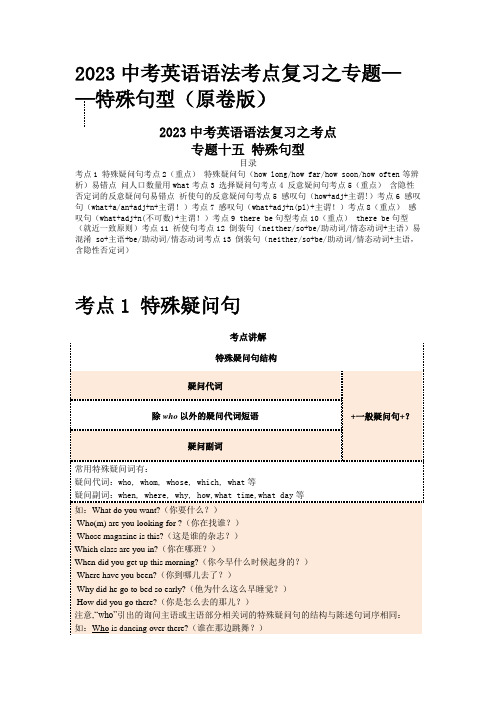
2023中考英语语法考点复习之专题——特殊句型(原卷版)2023中考英语语法复习之考点专题十五特殊句型目录考点1 特殊疑问句考点2(重点)特殊疑问句(how long/how far/how soon/how often等辨析)易错点问人口数量用what考点3 选择疑问句考点4 反意疑问句考点5(重点)含隐性否定词的反意疑问句易错点祈使句的反意疑问句考点5 感叹句(how+adj+主谓!)考点6 感叹句(what+a/an+adj+n+主谓!)考点7 感叹句(what+adj+n(pl)+主谓!)考点8(重点)感叹句(what+adj+n(不可数)+主谓!)考点9 there be句型考点10(重点) there be句型(就近一致原则)考点11 祈使句考点12 倒装句(neither/so+be/助动词/情态动词+主语)易混淆 so+主语+be/助动词/情态动词考点13 倒装句(neither/so+be/助动词/情态动词+主语,含隐性否定词)考点1 特殊疑问句精选练习1.(2021·广西·北海市教育教学研究室二模)—________ do you like the movie Better Days(《少年的你》)? —I love it. Jackson Yi is my favorite actor. He plays well in the movie.A.What B.Why C.How D.Who2.(2020·湖南湘西)—________do you think of movie Me and My Motherland? —I love it! It's a great movie.A.How B.What C.When3.(2021·江苏连云港)—________ is the concert going to start? —I’ve no idea. Why not check the ticket?A.What time B.What about C.How long D.How often4.(2021·湖北荆州)—______ do you usually start doing your homework? — Right afterI finish dinner.A.When B.Where C.What D.Why5.(2021·山东莱芜·二模)—The tea tastes good. ________ was it produced? —In Rizhao.A.How B.What C.When D.Where6.(2021·山东商河·二模)—________ is your music teacher? —Frank. He is kind to us. A.Where B.Why C.What D.Who7.(2021·北京海淀·二模)—________ book is this, Bill? —Sorry, it’s mine. A.Whose B.Which C.What D.Who考点2(重点)特殊疑问句(how long/how far/how soon/how often等辨析)考点讲解精选练习8.(2021·山东长清·二模)—________is it from the railway station to the city park? —Half an hour by bus.A.How long B.How soon C.How far D.How often9.(2020·四川广元)—________has she been in Beijing? —Since five years ago. A.How far B.How soon C.How long10.(2021·云南五华·二模)—________ times have you visited the Forbidden City? —Oh, only once.A.How much B.How long C.How far D.How many11.(2021·广西柳州)—________ is the schoolbag?—60 yuan.A.How often B.How old C.How much12.(2020·湖南怀化)— ______ do you usually exercise? —I usually exercise every morning.A.How far B.How long C.How often13.(2020·湖北黄石)—________will the first tramcar(有轨电车) line be finished in Huangshi? —In two or three years.A.How long B.How soon C.How often D.How far易错点问人口数量用what考点讲解精选练习14.(2020·甘肃天水)—________ the population of Tianshui? —It’s about 3.6 million. A.How many B.How much C.What is D.Which is考点3 选择疑问句考点讲解精选练习15.(2019·吉林长春)—Do you like mooncakes or sandwiches for a picnic? —________. They are traditional Chinese food.A.Yes, I do B.Mooncakes C.No, I don't D.Sandwiches16.(2018·山东济南)—Does your uncle live in England or America? —________. He lives in London.A.Yes, he does B.In England C.No, he doesn’t D.In America17.(2021·吉林长春·二模)—Which subject do you like better, art or music? —________. Because I like painting so much.A.Yes, I do B.Art C.No, I don’t D.Music18.(2021·山东历城·一模)—Is the car new or old? —_______. I bought it just three days ago.A.Yes, it is B.It’s new C.No, it isn’t D.It’s old19.(2021·吉林·长春市宽城区教师进修学校一模)—Are the young men speaking German or French? —________. They are from Germany.A.Yes, they are B.No, they aren’t C.German D.French考点4 反意疑问句考点讲解精选练习20.(2020·贵州黔西)Jack, you’re going to the mountain village to help the children,________?A.don’t you B.do you C.aren’t you D.are21.(2021·上海浦东新·二模)My uncle prefers watching Cookery Programme to cooking, ________?A.does he B.doe sn’t he C.is he D.isn’t he22.(2021·上海青浦·二模)Mr. Brown’s lived in the small town near the beach for years,_______?A.doesn’t B.isn’t he C.can’t he D.hasn’t he23.(2020·广西柳州)It is a lovely dog. _____________?A.aren't they B.doesn't it C.isn't it考点5(重点)含隐性否定词的反意疑问句考点讲解精选练习24.(2021·上海虹口·二模)Few of the students in this school have been abroad before, ________?A.have they B.haven’t they C.do they D.did they25.(2021·江苏·模拟预测)—Uncle Wang hardly smokes, ________? —________. He often tells us smoking does harm to our health.A.does he; Yes B.does he; No C.doesn’t he; Yes. D.doesn’t h e; No26.(2021·江苏南京·模拟预测)Professor Tu Youyou never stops doing research on Chinese medicine, _______?A.is she B.isn't she C.does she D.doesn't she27.(2021·广西柳江·三模)Ben seldom takes exercises, ________?A.doesn’t he B.did he C.does he易错点祈使句的反意疑问句考点讲解精选练习28.(2020·甘肃天水)Let’s meet at the school gate, ________?A.shall we B.shall you C.will we D.will you考点5 感叹句(how+adj+主谓!)精选练习29.(2020·贵州安顺)—Pingtang Bridge has the highest concrete bridge tower in the world. — ________ amazing it is!A.How B.What C.What an30.(2021·吉林长春·模拟预测)________delicious the food is on the plate!A.How B.How a C.What D.What a31.(2021·江苏淮安·一模)—Did you go travelling during the May Day holiday? —Yes,I did. But you can’t imagine ________ the traffic was!A.What heavy B.what a heavy C.how heavy D.how a heavy32.(2021·吉林)________ important it is for teenagers to be creative!A.How B.What C.What a33.(2020·湖南郴州)—Look! The elephants are dancing to music. —________ smart they are!A.What B.How C.What a34.(2021·辽宁盘锦)Hi, Mom moved me to tears. ________ touching the movie was! A.What a B.How a C.How D.What35.(2021·云南文山·一模)—________ wonderful the music is! —Yes. It really makes me relax after a busy day.A.How B.What a C.What D.How a36.(2021·云南麒麟·一模)—________ Wang Wei is singing! Do you know he’s the winner in the school talent show? —Of course, I do. And I also know he won the first prize in the writing competition.A.How beautiful B.What a beautiful C.How beautifully D.What a beautifully 37.(2021·云南·三模)—Steve won first prize in the speech contest today. —_______ hard he works! We should learn from him.A.How B.What C.What a D.How a考点6 感叹句(what+a/an+adj+n+主谓!)考点讲解参考考点5精选练习38.(2021·山东济南)—Henry, can you take this box to the classroom? —All right. Oh, ________ heavy box!A.what a B.what an C.what D.how39.(2020·海南)—Look , that is Tower bridge! —Wow, _________great bridge it is! A.what B.how C.what a40.(2020·辽宁营口)— ____________ special class we had today! We have learned about Chinese Kungfu. — That sounds really interesting.A.How B.How a C.What D.What a41.(2021·广西玉林)—My mother is planning to have a second child next year. —_______ good idea it is!A.What B.How C.What a D.What an42.(2021·江苏宿迁)—________ nice music lesson Mrs Wu gave us today! —Yes. We enjoyed it very much.A.What B.What a C.How D.How a43.(2020·四川乐山)—____________ terrible mess you have made! —Sorry, Mum. I will clear it up right now.A.What a B.What C.How44.(2021·江苏淮安)________ great scientist Yuan Longping is! He spent all his life on the research of rice.A.What B.What a C.How D.How a45.(2021·辽宁营口)—Look! The kids are playing on the playground. —________ great time they are having!A.What B.How C.What a D.How a考点7 感叹句(what+adj+n(pl)+主谓!)考点讲解精选练习46.(2021·甘肃庆阳·二模)________ lovely boys they are! I really enjoy myself when I stay with them.A.How B.How a C.What D.What a47.—The firemen did all their best to put out the fire. ---_____excellent firemen! A.What B.What an C.How an D.How48.(2021·辽宁绥中·一模)—____________ good grades I hope to get in this exam! —I am sure you will.A.What B.How C.What a D.How a49.(2021·云南昆明·二模)The medical workers in China have made great achievements during the COVID-19 epidemic. ________ brave and helpful men they are!A.What B.How a C.How D.What a50.—Have you watched the boat races this Dragon Boat Festival? --Yes.______wonderful races!A.What an B.What a C.What D.How考点8(重点)感叹句(what+adj+n(不可数)+主谓!)考点讲解参考考点7精选练习51.(2021·黑龙江绥化)________ helpful advice she gave me on how to get on with others! A.What B.What a C.How52.(2021·湖南邵阳)—________ fun it is to go to Mount Lang after the graduation examination! —Yes. Let’s go together.A.What B.What a C.How53.(2020·青海西宁)— The Belt Road has improved the trade between China and other countries. — Sure! ________ exciting news for people all over the world!A.What B.What an C.How D.How an54.(2021·黑龙江虎林)________ great progress my daughter has made!A.What a B.How C.What55.(2020·四川遂宁)—________ hot weather it is! Why not have a cold drink? —Sounds good! Let’s go.A.What B.What a C.How D.How a考点9 there be句型考点讲解精选练习56.(2020·上海)There________more than two ways to solve this maths problem.A.am B.is C.are D.be57.(2021·吉林船营·一模)There ________ a music festival in our school last Sunday. A.is B.was C.are58.(2021·黑龙江香坊·三模)— What will the weather be like tomorrow? — The radio says there ________ a heavy rain in the afternoon.A.will have B.is going to have C.will be59.(2021·黑龙江·模拟预测)—What can we do with the pollution? —If all of us pull together, ________ something we can do to improve the environment.A.it might be B.there should have C.there must be考点10(重点) there be句型(就近一致原则)考点讲解精选练习60.(2020·青海)—________ an amusement center, some restaurants and hundreds of stores in the shopping mall. —Wow, it’s amazing. I will go next week.A.There is B.There are C.There will be61.(2020·黑龙江牡丹江)There ________still some milk and fruit in the fridge. What else shall we buy?A.is B.isn’t C.are考点11 祈使句考点讲解精选练习62.(2020·上海)—Tom,________here to carry the luggage upstairs for me,will you?—All right.A.come B.came C.coming D.to come63.(2020·黑龙江绥化)__________ walk on the grass.A.Doesn’t B.Don’t C.Not64.(2021·上海嘉定·二模)Lucy, _______ me your dictionary, please. I want to look up the new word.A.pass B.passed C.passing D.to pass65.(2020·湖南湘西)Please ___________ the rubbish into different litter bins according to the signs.A.puts B.put C.to put66.(2021·内蒙古呼和浩特)________ to use sunglasses to stop the sun from shining directly in your eyes.A.Remembering B.To remember C.Remember D.Not remember67.(2020·辽宁营口)—____________ the dishes after dinner, Tony. —No problem, Mom.A.Washing B.Washes C.To wash D.Wash考点12 倒装句(neither/so+be/助动词/情态动词+主语)精选练习68.(2019·湖北鄂州)–Last summer holiday, I didn’t go anywhere. How boring!–________ . But I’m going somewhere for a holiday this summer.A.Neither I did B.Neither did I C.So did I D.So I did69.(2021·福建泉州·二模)—I don’t have time to go for a trip, for I am always busy doing my work. —________. I really hope to have plenty of time to travel across our country. A.Neither do I B.Neither am I C.So do I70.(2020·黑龙江绥化)—Will you go to the movies tomorrow? —If you don’t go,__________.A.neither do I B.neither won’t I C.neither will I71.(2021·云南·三模)—She is watering flowers. What about you? —________.A.So do I B.So am I C.So I do D.So I am72.(2021·黑龙江肇源·二模)—Jane got a cold this morning. She asked for two days’ leave. — ________, I had to see the doctor.A.So did I B.So I did C.So did she D.So she did73.(2020·四川达州)— It was the Dragon Boat Festival last Sunday. I drove to the Lianhua Lake to watch the boat races. How exciting! —_________, but I didn’t see you there.A.So I did B.So did I C.So do I D.Neither did I74.(2021·黑龙江·齐齐哈尔市碾子山区教师进修学校一模)— John sings well in our school. — ________ Henry, my best friend. He is also popular!A.So does B.Neither does C.So is易混淆 so+主语+be/助动词/情态动词考点讲解精选练习75.(2019·甘肃天水)—Peter has made great progress in English recently. —________. He has been studying so hard these days.A.So have he B.So he has C.So he have D.So has he考点13 倒装句(neither/so+be/助动词/情态动词+主语,含隐性否定词)考点讲解精选练习76.(2019·黑龙江绥化)If you take a vacation this summer, so ________ I.A.will B.do C.am77.(2019·贵州铜仁)“I know nothing about the film Titanic.” “________.”A.Neither do I B.So do I C.Neither did I D.So did I78.(2020·黑龙江牡丹江)—I have never been to Hawaii. What about Mike? —________.A.So has he B.Neither he has C.Neither has he。
专题15-简单句-2023年中考英语知识清单(通用版) 带解析

专题15-简单句2023年中考英语知识清单(通用版)目录考情分析: (1)1.简单句的句型 (1)2.句子的种类 (2)3.牛刀小试 (8)考情分析:简单句的五种基本句型及There be句型是英语学习的基础和重点,也是中考试卷的重点,在书面表达、句子改写和翻译句子中都经常考查有关句子的知识;感叹句、疑问句、祈使句更是单项选择和句型转换的重点。
1.简单句的句型简单句就是句子只有一个主语和谓语,有五种基本句型:(1)主语+谓语:这种句型称为主谓结构(S+V),其谓语一般是不及物动词。
如:The rain stopped.雨停了。
Things have changed now.现在事情发生了变化。
(2)主语+连系动词+表语:这种句型称为主系表结构(S+L+P),连系动词在形式上也是一种谓语动词,表语一般是名词或者形容词。
如:His father is a teacher.他的爸爸是老师。
(表语是名词)Your mother is very young.你的妈妈很年轻。
(表语是形容词)(3)主语+谓语+宾语:这种句型称为主谓宾结构(S+V+O),其谓语动词是及物动词,宾语一般是直接宾语。
如:They often speak English at the meeting.他们在会上经常说英语。
The house caught fire.房子着火了。
(4)主语+谓语+间接宾语+直接宾语:这种句型称为主谓宾宾结构(S+V+O+O),其谓语动词必须是可以跟双宾语的动词,两个宾语中表示事物的是直接宾语,另一个表示人的是间接宾语。
如:My father gave me a pen last night.昨天晚上我爸爸给我一支钢笔。
I will write you a letter when I get there.我到那里儿时给你写信。
(5) 主语+谓语+宾语+宾语补足语:这种句型称为主谓宾及宾补结构(S+V+O+C)其谓语动词必须是可以跟复合宾语的及物动词。
人教版初三英语上unit15知识点讲解及练习
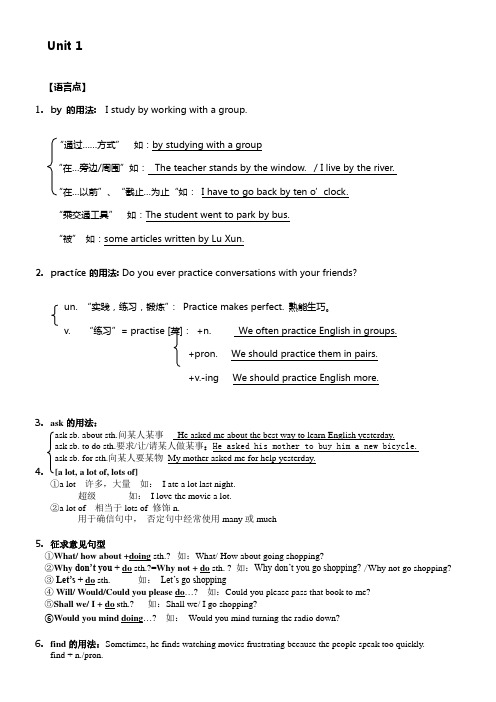
Unit 1【语言点】1.by 的用法:I study by working with a group.“通过……方式”如:by studying with a group“在…旁边/周围”如:The teacher stands by the window. / I live by the river.“在…以前”、“截止…为止“如:I have to go back by ten o’clock.“乘交通工具” 如:The student went to park by bus.“被”如:some articles written by Lu Xun.2.practice的用法: Do you ever practice conversations with your friends?un. “实践,练习,锻炼”:Practice makes perfect. 熟能生巧。
v. “练习”= practise [英]:+n. We often practice English in groups.+pron. We should practice them in pairs.+v.-ing We should practice English more.3.ask的用法:ask sb. about sth.问某人某事He asked me about the best way to learn English yesterday.ask sb. to do sth.要求/让/请某人做某事:He asked his mother to buy him a new bicycle.ask sb. for sth.向某人要某物My mother asked me for help yesterday.4.[a lot, a lot of, lots of]①a lot 许多,大量如:I ate a lot last night.超级如:I love the movie a lot.②a lot of 相当于lots of 修饰n.用于确信句中,否定句中经常使用many或much5.征求意见句型①What/ how about +doing sth.? 如:What/ How about going shopping?②Why don’t you + do sth.?=Why not + do sth. ? 如:Why don’t you go shopping? /Why not go shopping?③Let’s + do sth. 如:Let’s go shopping④Will/ Would/Could you please do…? 如:Could you please pass that book to me?⑤Shall we/ I + do s th.? 如:Shall we/ I go shopping?⑥Would you mind doing…? 如:Would you mind turning the radio down?6.find的用法:Sometimes, he finds watching movies frustrating because the people speak too quickly.find + n./pron./ 介词短语/ 分词)it 做形式主语I find him friendly.We found him in bed.We found her honest.He found the window closed.I found him working in the garden.③it 还可作形式主语:It is + adj. + to do7.We get excited about something and end up speaking in Chinese ./ 过去分词/ 此刻分词)使某种情形发生把鞋擦干净Get the shoes clean.我想去修自行车I want to get my bike repaired.你不能让他老等着You can’t get him waiting.②get 可作系动词Be(am /is /are /was /were)系动词表维持(stay /keep)表改变(get /become /turn)+adj.感官动词(…起来):feel /look /sound /smell /taste……③end 的用法:at the end of …“在…的末尾、结尾” At the end of the concert at the end of the road n. in the end “最后”,“终于” (at last, finally ) In the end I decided to stay here.by the end of “到…终止时/…时为止By the end of this summer holiday, I had finished my homework.v. end up doing sth. 终止做某事= finish doing sth.end up with 以…终止The party ended up with her singing.8.afraid的用法:I was afraid to speak in class……that+从句恐怕…I’m afraid that I can’t come here on time.be afraid to do sth.不敢做某事She was afraid to go out alone at night.of可怕I was afraid of snakes when I was young.9.deal with 处置:How do we deal with our problems?deal with:偏重于方式,方式,特殊疑问句顶用how I don't know how he deal with the problem.do with: 偏重对象,特殊疑问句用what I don't know what he did with the problem.10.unless除非,假设不,若是不。
九年级英语 unit 15 语法要点 人教新目标(Go for it)
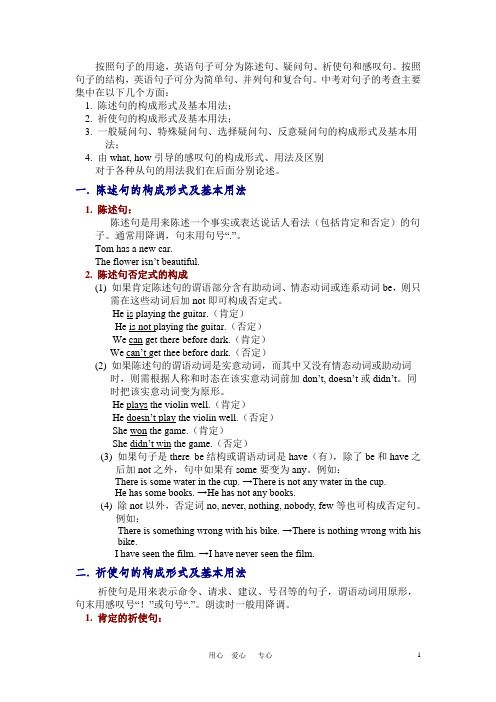
按照句子的用途,英语句子可分为陈述句、疑问句、祈使句和感叹句。
按照句子的结构,英语句子可分为简单句、并列句和复合句。
中考对句子的考查主要集中在以下几个方面:1. 陈述句的构成形式及基本用法;2. 祈使句的构成形式及基本用法;3. 一般疑问句、特殊疑问句、选择疑问句、反意疑问句的构成形式及基本用法;4. 由what, how引导的感叹句的构成形式、用法及区别对于各种从句的用法我们在后面分别论述。
一. 陈述句的构成形式及基本用法1. 陈述句:陈述句是用来陈述一个事实或表达说话人看法(包括肯定和否定)的句子。
通常用降调,句末用句号“.”。
Tom has a new car.The flower isn’t beautiful.2. 陈述句否定式的构成(1) 如果肯定陈述句的谓语部分含有助动词、情态动词或连系动词be,则只需在这些动词后加not即可构成否定式。
He is playing the guitar.(肯定)He is not playing the guitar.(否定)We can get there before dark.(肯定)We can’t get thee before dark.(否定)(2) 如果陈述句的谓语动词是实意动词,而其中又没有情态动词或助动词时,则需根据人称和时态在该实意动词前加don’t, doesn’t或didn’t。
同时把该实意动词变为原形。
He plays the violin well.(肯定)He doesn’t play the violin well.(否定)She won the game.(肯定)She didn’t win the game.(否定)(3) 如果句子是there be结构或谓语动词是have(有),除了be和have之后加not之外,句中如果有some要变为any。
例如:There is some water in the cup. →There is not any water in the cup.He has some books. →He has not any books.(4) 除not以外,否定词no, never, nothing, nobody, few等也可构成否定句。
中考英语高频语法小专题考点讲练系列十五+spend+take+pay+cost+花费系列

英语高频语法小专题考点讲练系列十五spend take pay cost 花费系列一:spend、cost、pay和take的含义与区别:二、高频考点:1,Sb spend time (in) doing sth.花时间做某事,中间的介词in可省略。
注意用spend时,前面的主语是人(sb),spend后接doing.2,It takes/took sb time to do sth.做某事花了某人多长时间。
注意take 前的主语是it.后面加动词to do。
三、综合训练1、单项选择:1. She usually ________ much time shopping in the supermarkets.A spendsB costsC takesD pays2. American students spend ________ time _________ homework than Chinese students.A. fewer, doingB. less, to doC. less, doingD. least, doing3. This kind of computer _______ too much. I can't afford one.A takes B. spends C. pays D. costs4. It will ________ us several years to learn a foreign language well. (09无锡)A. costB. takeC. spendD. use5. I'm interested in animals, so I ___every Saturday working in an animal hospital.A. payB. costC. takeD. spend6. They spend too much time _____the report(报道).A. writingB. to writeC. wroteD. write7. -Do you often get online?--Yes, I ____ lots of time on it. It’s a good way to kill time.A. costB. spendC.takeD. pay8. --l think traveling around the city by taxi is very convenient.--Yes, but it_____ too much.A. paysB. costsC. spendsD. takes9. A new computer ______________ a lot of money.A. Spent B .pay C. costs D takes10. May I borrow 12 Yuan from you? I'll ______ it back next week.A. pentB. payC. costs D takes11. I have to them 20 pounds for this room each month.A. payB. paidC. costD. took12. They spend too much time the report.A. writingB. to writeC. on writingD. write13. --What beautiful shoes you’re wearing! They must be expensive .--No,they only l0 yuan.A.spent B.took C.paid D.cost 14. --Will you please for my dinner, Peter?--Sure!A. spendB. payC. costD.take15. It will me too much time to read this book.A. takeB. costC. spendD.pay16. This science book ____ me a great amount of money.A. tookB. costC. usedD. spent17. It takes me two hours my work.A. finishing B finished C. to finish D .finishes18. I two hours on this maths problem yesterday.A. takeB. costC. pay D .spent19. Andy spent lots of money books.A. onB. inC. for D to20. How much did you pay all these things?A. onB.forC. in D to/2、1.2、句子翻译1、我将在学习上花更多的时间。
初三Unit15重难点解析
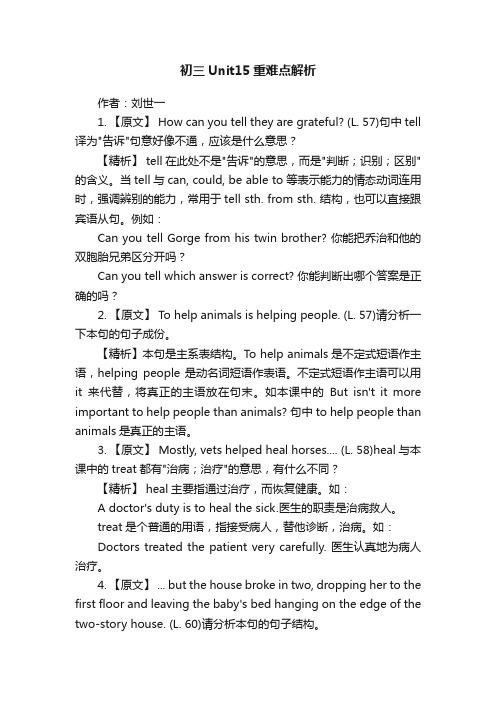
初三Unit15重难点解析作者:刘世一1. 【原文】 How can you tell they are grateful? (L. 57)句中tell 译为"告诉"句意好像不通,应该是什么意思?【精析】 tell在此处不是"告诉"的意思,而是"判断;识别;区别"的含义。
当tell与can, could, be able to等表示能力的情态动词连用时,强调辨别的能力,常用于tell sth. from sth. 结构,也可以直接跟宾语从句。
例如:Can you tell Gorge from his twin brother? 你能把乔治和他的双胞胎兄弟区分开吗?Can you tell which answer is correct? 你能判断出哪个答案是正确的吗?2. 【原文】 To help animals is helping people. (L. 57)请分析一下本句的句子成份。
【精析】本句是主系表结构。
To help animals是不定式短语作主语,helping people是动名词短语作表语。
不定式短语作主语可以用it来代替,将真正的主语放在句末。
如本课中的But isn't it more important to help people than animals? 句中to help people than animals是真正的主语。
3. 【原文】 Mostly, vets helped heal horses.... (L. 58)heal与本课中的treat都有"治病;治疗"的意思,有什么不同?【精析】 heal主要指通过治疗,而恢复健康。
如:A doctor's duty is to heal the sick.医生的职责是治病救人。
treat是个普通的用语,指接受病人,替他诊断,治病。
- 1、下载文档前请自行甄别文档内容的完整性,平台不提供额外的编辑、内容补充、找答案等附加服务。
- 2、"仅部分预览"的文档,不可在线预览部分如存在完整性等问题,可反馈申请退款(可完整预览的文档不适用该条件!)。
- 3、如文档侵犯您的权益,请联系客服反馈,我们会尽快为您处理(人工客服工作时间:9:00-18:30)。
中考英语语法专题详解十五专题十五状语从句考点聚焦状语从句的定义用来修饰动词和形容词,以表明动作发生或状态存在的时间,地点,原因等等的句子叫做状语从句。
状语从句的分类一、时间状语从句时间状语从句表示时间,引导词有:when, while, as, till, until before, after, since等。
时间状语从句的引导词所表示的意思不尽相同,要注意把握不同引导词所表示的不同时间关系,以及它在具体句子中对应的时态、语态等问题。
注意:as(在……时候,因为),since(自从,因为),它们可以引导时间从句,并强调主句和从句的动作同事发生。
并且while有时还可以表示对比。
例如:(1)While my mother was reading the newspaper, I was watching TV.(read是延续性的动词,read和watch同事发生)I like playing football while you like playing basketball.我喜欢踢足球,而你喜欢打篮球。
(对比)(2)when(当……的时候),引导的从句的谓语动词可以是延续性动词,也可以是瞬间动词。
从句动作可与主语动作同事发生,也可在其后发生。
I was reading a book when she came into my room.(come是瞬间动词,只能用when引导,不能用while)I often missed my home when(while) I lived in NewYork.(live是延续性动词,when可用while代替)(3)when和while的区别还在于:while引导的时间状语从句多用于进行时态,而when 引导的时间状语从句多用于一般时态。
While they were talking, the bell rang.正在他们谈话的时候,上课铃响了。
(4)as译作“一边……一边”、“随着……”,侧重主句和从句的动作同时发生。
有时可与when,while通用。
We always sing as we walk.我们总是边走边唱。
(as表示“一边……一边”)As you grow, you will know more and more。
随着年龄的增长,你会懂得越来越多。
2.till或until引导的时间状语从句till,until(直到……才):一般情况下两者可以互换,但是在强调句型中多用until。
till 不可以在句首,而until可以放在句首。
注意:如果主句中的的谓语动词是瞬间动词时,必须用否定形式;如果主句中的谓语动词是延续性动词时,用肯定或否定形式都可以,但表达的意思不同。
例如:I didn’t go to bed until(till) my father came back.直到我父亲回来我才上床睡觉。
(go to bed 是瞬间动词,主句用否定形式)I talked until he came back.我工作到他回来为止I didn't work until he came back.他回来我这才开始工作Please wait until I arrived.在我到达之前等我。
3.since引导的时间状语从句Since(自从):引导的从句的谓语动词可以是延续性的动词,也可以是瞬时动词。
一般情况下,从句谓语动词用一般过去时,而主句的谓语动作用现在完成时。
但在It is+时间+since从句的句型中,主句多用一般现在时。
例如:I have been in Beijing since you left. 自从你离开以来,我一直在北京。
Where have you been since I last saw you? 自上次我和你见面以后,你到哪里去了?It is five months since our boss was in Beijing. 我们老板离开北京有五个月了。
4.由before和after引导的时间状语从句注意:(1)before(在……之前):引导的从句不再用否定的谓语。
(2)当主句用将来时,从句总是用现在时;如果before引导的从句谓语用的是过去时。
则主句动词多用过去完成时,这样以便体现动作发生的先后。
(3)after(在……之后):表示主句动作发生在从句动作之后。
如果主句用的是过去时,则从句多用过去完成时。
例如:It will be four days before they come back. 他们要过四天才能回来My father had left for Canada just before the letter arrived. 我父亲恰好在信到之前去加拿大了。
After we had finished the work, we went home. 完成工作之后,我们回家了(从句用过去完成时,主句用一般过去时)5.由as soon as ,immediately, directly ,instantly, the moment, the instant, the minute,等引导的时间状语从句:这些连词都表示“一……就”。
例如:I will go there directly I have finished my breakfast.吃完早饭,我立即到那里去。
The moment I heard the news, I went to the school. 我一听到消息,马上赶到了学校。
As soon as I reach Canada, I will ring you up.我一到加拿大,就给你来电话。
注意hardly(scarcely,rarely)……when,before,no sooner …than相当于as soon as之意。
主句用过去完成时,从句用一般过去时态。
当hardly,scarcely, rarely和no sooner位于句首时,主句应用倒装语序。
例如:Hardly had I sat down when he stepped in ,我刚坐下,他就进来了。
二、原因状语从句原因状语从句表原因,常见的引导词有:because(因为),since(既然),as(既然),for(因为)1.becausey引导的原因状语从句一般放于主句之后,because表示直接原因,语气最强,回答why引导的疑问句必须使用because。
I do it because I like it..——Why didn’t he come yesterday?——Because he had something important to do.注意“not……because”结构中的not否定的是because引导的整个从句,例如:The country is not strong because it is large.国强不在大.2.Since引导的原因状语从句一般位于主句之前,表示已知的、显然的理由。
通常被翻译成“既然”,较为正式,语气比because弱。
Since you are free today, you had better help me with my mathematics,既然今天你休息,你最好帮我补习数学。
3.as引导原因状语从句时表示附带说明的“双方已知的原因”,语气比since弱,较正式,位置较灵活,常放于主句之前。
As it is raining, you’d better take a taxi,既然在下雨,你最好乘出租汽车。
4. for引导的原因状语从句并不说明主句行为发生的直接原因,只提供一些辅助性的补充说明,for引导的原因状语从句只能放于主句之后并且必须用逗号将其与主句隔开。
He could not have seen me, for I was not there.他不可能见过我,因为我不在那里。
三、条件状语从句引导条件句常用的连词有if(如果),unless(如果不,除非)等,条件状语从句和时间状语从句一样,表示将来要用一般现在时态。
We won’t let you in unless you show your pass.If you fail again this time,what will you do?(1)if引导的条件状语从句表示将来时,要用一般现在时代替,主句仍使用一般将来时态。
(2)将if引导的宾语从句和状语从句进行混淆考查,宾语从句中的if表示“是否”,可以使用一般将来时。
四、让步状语从句让步状语从句表示“虽然,即使,尽管”。
引导词有although,though,even though, even if都表示“虽然,即使,尽管”之意。
主句中不能用but,但可用yet、Though和although语气较弱(其中的though比although通俗,不如although正式),even if和even though带有强调意味而显得语气更强。
例如:Although they are poor ,they are happy yet.虽然他们很穷,但很快乐The article is very important though it is short.那篇文章虽然很短,但很重要。
Even though it was raining, she walked to work.即使下雨,她也是走着去工作的。
I’ll visit him this evening even if I can stay only a few minutes.今晚我将去拜访他,即使我只能停留一小会儿。
注意though引导的让步状语从句的用法比较特殊,它可以倒装,也可以不倒装。
五、地点状语从句地点状语从句常由where和wherever引导,通常可置于主句之前或之后。
如:We should go where(ver) we are most needed,我们要去最需要我们的地方。
Where there is a will, there is a way.有志者,事竟成。
六、目的状语从句目的状语从句通常由so that, in order that 引导,所引导的从句通常放在主句后面。
目的状语从句中的谓语常含有may (might),can (could),shall ,will 等情态动词。
如:He always takes a seat in the first row so that/in order that he can hear better.= In order that he can hear better, he always takes a seat in the first row.为了听得更清楚,他总是坐前排的座位。
